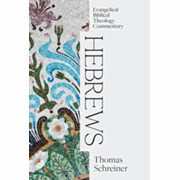In his commentary on Hebrews, Thomas R. Schreiner describes Hebrews as a sermon or exhortation in epistolary form that exhorts its readers to hold fast to their faith. While theories of authorship are fascination and alluring, it author remains unknown. Even though we do not know the author, everyone agrees on it’s canonicity and importance to the Christian faith. Schreiner explores various themes within the book including promise-fulfilment, already-but-not-yet eschatology, typology, and spatial orientation. I found his discussion on typology especially interesting and impactful. The introduction begins with an excellent summation of the story line of the Bible that sets the scene for understanding Hebrews. Hebrews has a rich theology and some of the most contested or misunderstood passages in the New Testament, such as the warning passages and apostasy.
“Hence, the events, institutions, and persons in which there is a typological relationship are not merely accidents of history, nor are they simply employed by God as helpful illustrations. On the contrary, the persons, events, and institutions were intended from the beginning as anticipations of what was to come… Biblical typology is characterized by escalation. This means that the fulfilment is always greater than the type.”
The Evangelical Biblical Theology Commentary (EBTC) focuses on the Biblical Theology expressed by their authors on their own terms and in their own historical contexts. Biblical Theology seeks to trace the central themes of the individual books of Scripture. This commentary intends to communicate the worldview of the biblical authors and how the original audience would understand the text. In focusing on the Biblical themes instead of a verse-by-verse exegesis, you begin to see the bigger story of Scripture as it was understood when it was written.
“From one angle Hebrews can be read as a call to assurance. The warnings and admonitions are also given so the readers will be convinced they are on the right path, that they are truly clean before God by virtue of what Christ has done. The warnings aren’t meant to cast doubt about the readers assurance but to strengthen and confirm it. The author doesn’t want them to doubt whether they are Christians but to be encouraged to keep living as Christians.”
Each author of the EBTC volumes is given freedom in the order and structure to best suite the biblical material being presented. Schreiner has arranged the commentary with an introduction, verse-by-verse commentary/exposition followed by the Biblical Theology themes. After reading through the commentary, I felt like it would have been beneficial to read through the Biblical Theology section before the verse-by-verse commentary. I did not understand Schreiner’s position on assurance and apostasy while reading through the commentary until I read the Biblical Theology section. The commentary utilizes the author’s translation for the verse to verse commentary. Each section of Scripture is broken down into the outline, Author’s translation of the Scripture passage, context, exegesis, and bridge. The binding and cover art provide for a quality and aesthetically pleasing addition to anyone’s library which seems trivial but I greatly appreciate it.
“Jesus lived a truly human life, knowing human suffering and temptation. He didn’t live a privileged existence separated from the travails of ordinary human beings. He knew the anguish of temptation and the sorrows that blight human existence. He learned obedience in the midst of his sufferings and temptations… In 2:10 Jesus is said to be perfected through his sufferings. He wasn’t purified of existing sin in his sufferings since he was already without sin, but he was qualified to serve as high priest by his sufferings. Merely being without sin did not qualify Jesus to serve as high priest. He needed to experience life, to be tested, and to suffer (2:18).”
Thomas R. Schreiner (PhD, Fuller Theological Seminary) is associate dean and James Buchanan Harrison Professor of New Testament Interpretation at The Southern Baptist Theological Seminary. Schreiner is the author of numerous commentaries and books.
“He [Jesus] sympathizes ‘with our weaknesses.’ The word sympathy is not limited to compassion and empathy but also denotes Jesus’ ability to help those who are afflicted.”
I highly recommend Schreiner’s EBTC commentary on Hebrews for pastors, church teachers, seminary students, and those wanting a faithful and insightful commentary of Hebrews. Schreiner writes in a way that makes the complex themes of Hebrews understandable and relatable. Our understanding of Scripture should never terminate on increased knowledge only, it should confront us and change us. Hebrews does just that, it encourages us to grow in our maturity while sympathizing with our weakness and dependence on Christ who is better in every way.
 |
Hebrews: Evangelical Biblical Theology Commentary By Thomas Schreiner |
I received a free copy in exchange for my honest review. The opinions I express are my own and I was not required to write a positive review.
